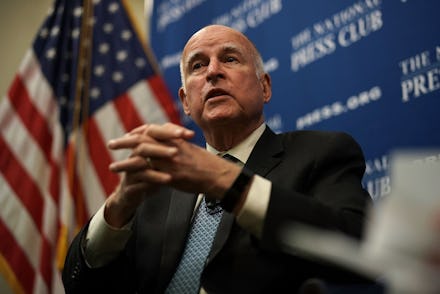How Gov. Jerry Brown is trying to save California from Trump on his way out the door

California Gov. Jerry Brown signed — and vetoed — the final bills of his 16-year gubernatorial career over the weekend, finishing out his term by continuing to champion Democratic causes while still striking down some bills favored by progressive advocates.
Brown continued his rebuke against the Trump administration and Republicans in Washington, D.C., with his final legislative acts. After hitting back against Trump’s decision to pull out of the Paris climate accord earlier in September by unveiling an ambitious climate agenda, Brown countered Trump again Sunday by signing “gold standard” net neutrality legislation that immediately prompted a legal challenge from the Trump administration.
The California governor also took aim at the Republican-controlled Senate with his signing of a bill that requires corporations to include a representative number of women on their board of directors.
In his signing message for the bill, Brown noted that “recent events in Washington, D.C. — and beyond — make it crystal clear that many are not getting the message.” A copy of that message was sent to the Senate Judiciary Committee, which has been criticized for its entire Republican membership consisting of white men as the committee handles allegations of sexual assault against U.S. Supreme Court nominee Brett Kavanaugh.
Other signed bills advanced Democratic causes. Brown signed a slate of criminal justice reform legislation that eliminates automatic penalties that increase sentences, ends the practice of 14- and 15-year-olds of being tried in adult court and increases transparency in police shootings, among other measures. The governor also signed several pieces of gun control legislation, which include such measures as raising the minimum age to purchase a firearm to 21: imposing a lifetime ban on gun ownership for convicted domestic abusers and “dangerous gun owners;” increasing requirements for concealed-carry permits and banning bump stocks.
Brown also signed legislation pushed as part of the #MeToo movement, as sexual misconduct allegations have returned to the political spotlight and come under criticism by some Republicans in Washington in light of the Kavanaugh allegations. Included in the bills Brown signed devoted to women and family issues are SB 820, which prohibits nondisclosure agreements in sexual misconduct settlements, and SB 1300, which prohibits signing an NDA as a condition of employment.
“As the #MeToo movement continues to shift the culture and thinking around sexual harassment and assault, SB 820 will be a critical part of that much-needed change in workplaces and communities in California,” State Sen. Connie Leyva said in a statement. “I appreciate Governor Brown standing with women and helping to empower those whose voices have been silenced for far too long.”
Other woman-centered legislation was struck down by Brown, however, including legislation that would require public colleges to offer medication abortion and a bill taking aim at mandatory arbitration agreements. Brown also vetoed legislation that would have allowed non-citizens, whether documented or undocumented, to serve on local and state boards and commissions, as well as a bill to open safe injection sites for drug users in San Francisco.
Brown’s balanced approach may not extend to his successor. Democratic gubernatorial candidate Gavin Newson told the San Francisco Chronicle he supported the safe-injection site and medication abortion legislation that Brown vetoed, signaling a potentially more progressive approach. Republican candidate John Cox, meanwhile, would be unlikely to continue California’s history of taking on the Trump administration; Trump gave Cox his “total endorsement” on Twitter, saying he would “make California great again.”
While the New York Times noted the California legislature has rarely pushed back against Brown’s vetoes, that could also change under a new administration; Leyva has already announced plans to reintroduce the medication abortion bill and vetoed legislation on rape kit testing.
“You’re going to see a shift in power now,” Democratic Assembly Speaker Anthony Rendon told business leaders in Los Angeles, as quoted by the Times. “The Legislature is going to have more power than ever before.”